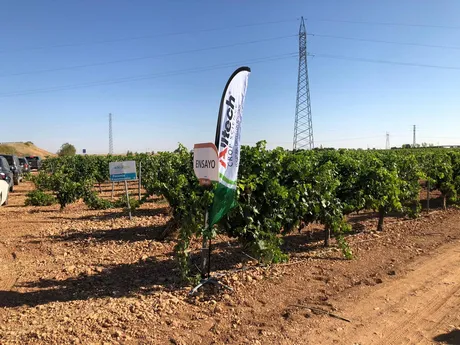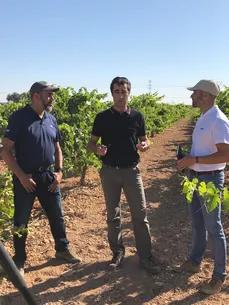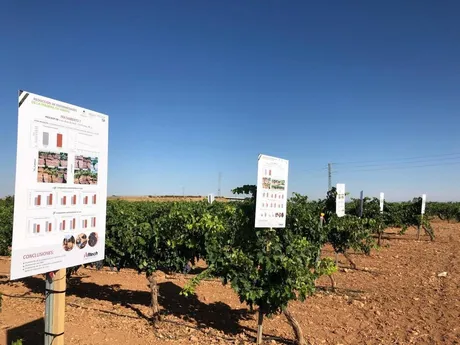Esca and other similar wood diseases are among the biggest threats to today’s global grape production. Esca itself is a complex disease that involves several different fungi. It attacks the main vine of the plant and can destroy the vine within a few days.
Some of the previous articles of from this Alltech Crop Science series dedicated to Esca and other similar wood diseases have explained the history and economic impact of Esca, exploring its biology and symptoms and the consequences it can have on plant health. Nicolas Body, European Technical Manager, has illustrated how the science of nutrigenomics can help Alltech find natural compounds to activate the genes responsible for the natural defences of the plant.

This article features an interview with Pedro Palazón, the technical director at IDEAGRO, who is working on a field-based trial project studying wood disease in Castilla La Mancha, Spain.
IDEAGRO is an independent research company working in service of the agri-food sector. Based in the Murcia region, IDEAGRO has extensive facilities, laboratories and fields in which it conducts these tests. In addition, IDEAGRO has made agreements with farmers that allow it to carry out trials throughout Spain and Portugal.
What is the objective of this research project?
Pedro Palazón: The objective of this project is to find solutions to alleviate the symptoms of wood diseases in wine grapes. It was developed by Bodegas Yuntero de Manzanares in Ciudad Real. In order to achieve the project objective, Ideagro has designed a complete work plan in which, for three years, the response of the crop will be evaluated, not only in terms of its vegetative development but also for any improvements to the quality of the wine made from these grapes. Based on previous experiences, we believe that a good way to reduce the damage that wood diseases cause to the crop is to activate the defence system of the plant itself. We also have the support of Juan Manuel Jiménez Castro, the agricultural technical engineer at the Department of Agricultural Services of Bodegas Yuntero, who is following up on the trials in partnership with companies and institutions, such as Alltech Crop Science and the University of Extremadura.
 What are the different stages of this project?
What are the different stages of this project?
Pedro Palazón: Initially, we identified molecules from the yeast cell wall that are known to act as elicitors of natural defences in many plants. These molecules are totally natural and are a good alternative to chemicals. During the first year of the trial, we carried out different tests until we found the most effective dose of the compounds to apply. In this, the second year, we are working on the frequency of application during the cycle to determine the best protocol.
And how does that work, exactly?
Pedro Palazón: For example, we are working with the yeast cell wall extract from Alltech Crop Science; it contains mannan-oligosaccharides, molecules that trigger the immune response of the plant, activating its natural defence system. We can observe the stimulation of defence molecules and enzymes, such as chitinase, antioxidant activity, polyphenols, etc. With the plant being primed, it is a lot harder for the wood disease to progress, and we can reduce the symptoms and the rate of incidence on the vineyard. Another side benefit is that the plant’s increase in phenolic compounds can increase the quality of the wine.
This seems to be quite a large-scale experiment?
Pedro Palazón: Yes, for sure. We know that the compounds we are working with have the potential to be effective from our previous work on other crops and in the laboratory, but wood diseases are very complex issues, especially when we try to activate them; the plant defends itself. In these cases, large-scale trials are mandatory to find a solution that will work for growers. The plots here cover a total of 11 hectares, on two varieties: Airén and Tempranillo. This is unique work on esca, as we are monitoring, individually, more than 2,000 vines during three years, with evaluation of all parameters: esca incidence, increase in production and quality, but also other wood and fungal diseases that are more common, such as powdery mildew. This is likely the most solid trial ever done on this issue.

Have you presented the results?
Pedro Palazón: On August 6, the Cooperative Jesús del Perdón-Bodegas Yuntero hosted a conference about "The Induction of Defenses to Mitigate Vineyard Wood Diseases." One hundred and fifty technicians and producers attended the event. Some of the results were presented, including that, so far, it has been possible to reduce the wood disease while also improving crop health and increasing the wine quality (i.e., antioxidants and polyphenols).
Are you optimistic about these trials?
Pedro Palazón: I am very optimistic. We have observed and measured excellent results already: a 20% reduction of the incidence of wood illness and a 60% reduction of severity, as well as a yield increase of up to 30%. Moreover, in leaves, there was an exponential increase of total phenols (30–60%), flavonoids (30–65%), phenylpropanoids (40–115%) and polyphenol oxidase activity (16–33%). In addition, in grapes, there has been an exponential increase of total phenols (25–72%), flavonoids (25–85%) and phenylpropanoids (35–100%), and polyphenol oxidase activity (10–50%) was observed. The success of the treatments applied indicates that we must continue working in this line in order to provide the agricultural sector with more effective and environmentally friendly solutions.
Alltech Crop Science is exploring natural-based solutions
Alltech Crop Science, a global leader in innovative, natural-based solutions, is looking at alternative programs to help farmers find a way to protect their vines. Our nutrigenomic research team is studying how nutritional programs can trigger the activation of defence genes, allowing the plant to better defend itself against internal diseases like esca. We are proud to be supporting the innovative work being done in Spain by our partners, who are leading the charge in solving this problem. The future of global grape production is in safe hands with Alltech Crop Science.
For more information:
www.alltech.com
